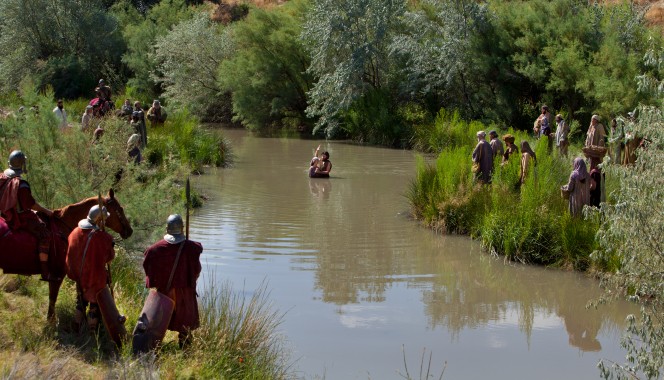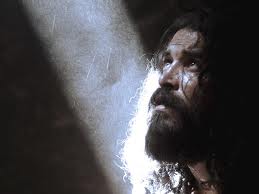 John the Baptist is a brash Nazarite, an older cousin of Jesus who confronts all with our need for repentance.
John the Baptist is a brash Nazarite, an older cousin of Jesus who confronts all with our need for repentance.
There was a man sent from God whose name was John. He came as a witness to testify about the light, so that all might believe through him.
John 1:6-7 CSB
The Gospel prologue of the Apostle John describes John the Baptist as an apostellō ἀποστέλλω, one commissioned or sent.
See: John 1:6
The Baptist has gained a notable following, therefore officials of the Temple send men to keep tabs on this brash Prophet.
John the Baptist is not the kind of parishioner you particularly want to visit your synagogue. He even challenges the validity of Herod, King of Judea. And even more threatening than that, John now has a growing following among common Jews, even as some advocate violence against their Roman captors.
Who are you?
19 This was John’s testimony when the Jews from Jerusalem sent priests and Levites to ask him, “Who are you?”
John the Baptist’s Testimony
And he confessed and did not deny; and this is what he confessed:
“I am not the Christ.”
21 “What then?” they asked him. “Are you Elijah?”
“I am not,” he said.
They asked this because of a prophesy of Malachi.
“Look, I am going to send you the prophet Elijah before the great and terrible day of the LORD comes.
click for Malachi reference
John is not the Messiah, but a messenger of the incarnation of the Messiah. Yet the Messiah would no more bring a terrible immediate judgment on Israel than John, but a lasting fulfillment of all prophesy.
“Are you the Prophet?”
“No,” he answered.
John humbly answers that he is not a Prophet, but Jesus will later state clearly that John is the greatest Prophet who has ever lived. The purpose for which John is sent is not prophesy, but announcement of the Messiah.
22 “Who are you, then?” they asked. “We need to give an answer to those who sent us. What can you tell us about yourself?”
23 He said,
“I am a voice of one crying out in the wilderness:
Make straight the way of the Lord—just as Isaiah the prophet said.”
click for reference to Yeshaiya (Isaiah) 40:3
What did they expect?
Let’s take a brief look at this prophesy of Isaiah for a contemporary Jewish understanding of what John the Baptist had told them as an answer to who he was.
Isaiah 40:
“Comfort, comfort my people,”
says your God.
2 “Speak tenderly to Jerusalem,
and announce to her
that her time of forced labor is over,
her iniquity has been pardoned,
and she has received from the Lord’s hand
double for all her sins.”
Understand that Jerusalem is not only a political capital of Judea, but a religious capital — a place of worship of the LORD for all Israel.
A once united Kingdom of Israel under David and Solomon is now ruled as several different Roman-governed captive states called principates. [click to see more] Octavian has seized power from the republic of Rome and proclaimed himself as the Emperor Augustus Caesar, a ruler to be worshiped as one of many Roman gods in the world he conquers.
3 A voice of one crying out:
Prepare the way of the Lord in the wilderness;
make a straight highway for our God in the desert.
4 Every valley will be lifted up,
and every mountain and hill will be leveled;
the uneven ground will become smooth
and the rough places, a plain.
5 And the glory of the Lord will appear,
and all humanity together will see it,
for the mouth of the Lord has spoken.
Isaiah’s prophecy for the freedom of Jerusalem does not say that all will take place at once; however the Jews, captives of Rome and led by a corrupt, evil and powerless King Herod, certainly must have hoped for the Lord to intervene as in the days of Moses.
In the time of John the Baptist, the wildness near the Jordan would have been a welcome escape from the delicate politics of the Pharisees, Priests, Scribes, Temple guards and Roman legions, who all maintained strict loyalties and delicate alliances.
Why do you baptize?
In fact, John, the messenger of the coming Messiah preached repentance. It is the same message proclaimed by all prophets whose message is from the Lord. ‘Return to Me and I will again be your Lord.’
John’s call to baptism of repentance is far more than a temporary religious cleansing, but personal commitment to a personal transformed return to the Lord.
Baptism is a symbolic and public witness of this permanent change.
click to learn more βάπτισμα
New traditions of worship established during Israel’s several recent captivities had cultivated a politically-charged conversation about religious observances and traditions. Not least among these religious disputes is the need for cleansing and the role of various religious authorities. Of course, Jerusalem’s religious authorities had been limited not only by Rome, but also by the Herod’s.
John 1:
24 Now they had been sent from the Pharisees. 25 So they asked him, “Why then do you baptize if you aren’t the Messiah, or Elijah, or the Prophet?”
26 “I baptize with water,” John answered them.
Here is John’s message for the religious officials of captive Jerusalem:
“Someone stands among you, but you don’t know him.
27 He is the one coming after me, whose sandal strap I’m not worthy to untie.”
MORE: He will baptize you with the Holy Spirit and fire.
What next for John the Baptist?
What do you suppose the reaction of the Pharisees in Jerusalem, Herod and others might be?
Fear, perhaps?
For if the one coming after John stands among them and they don’t even know Him, the Messiah of God will have great power.
Would the Messiah oppose the religious leaders of the chosen?
Further, John the Baptist has a great following of the common people, faithful Jews willing to repent of their sins. A righteous crowd following powerful leaders threaten a religious and political establishment subservient to Rome and disobedient to the LORD.
The Pharisees must be concerned about both the preaching of John and his announcement of the Messiah.

28 All this happened in Bethany across the Jordan, where John was baptizing.
To be continued...


Leave a Reply